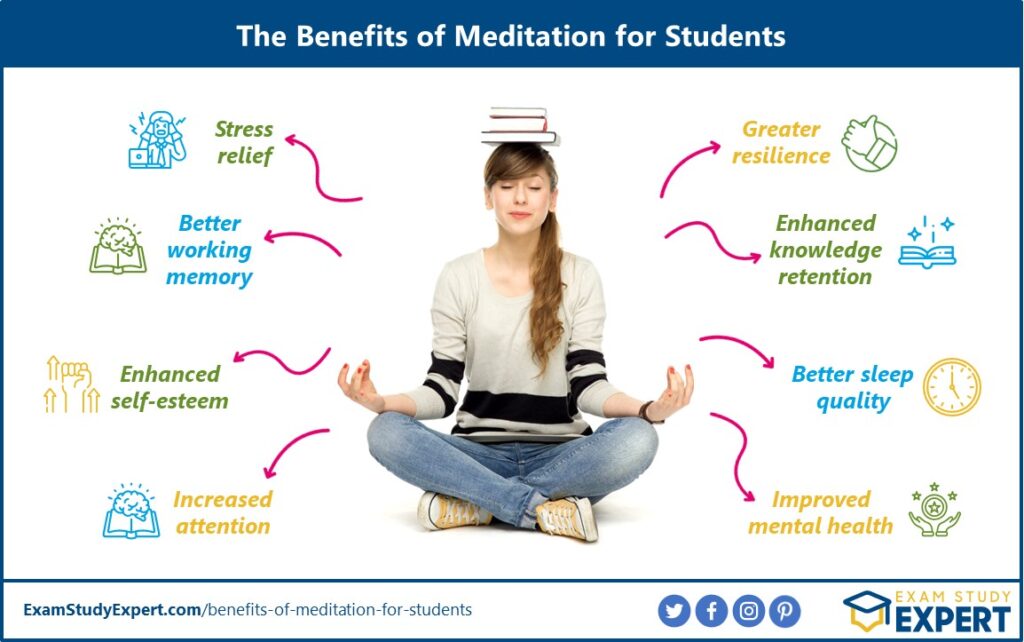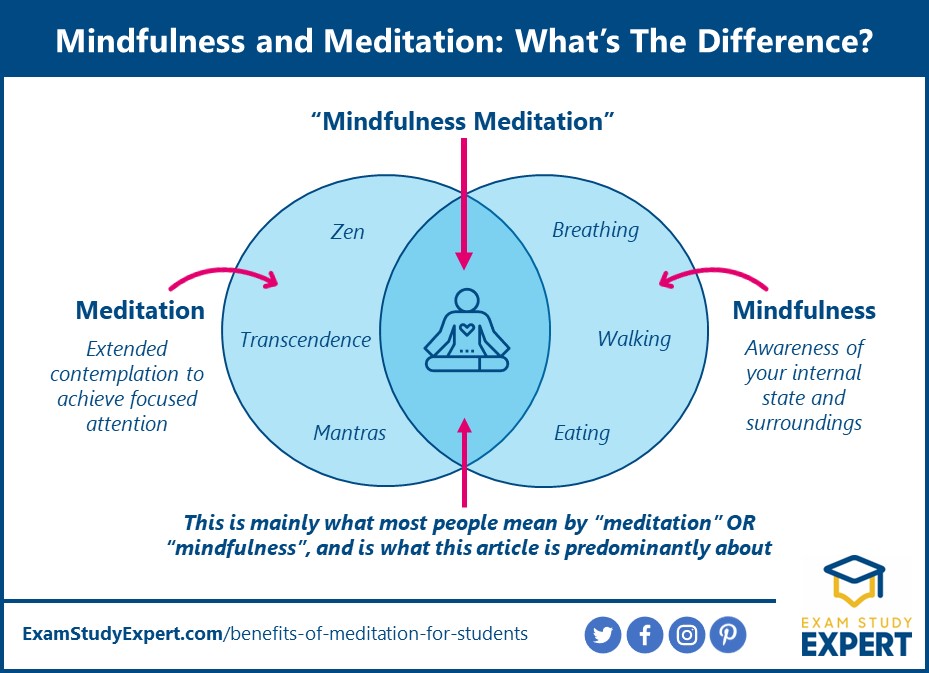I wholeheartedly endorse meditation for students. Decades of scientific research have shown that meditation has an wealth of benefits: ranging from sharper concentration to better memory, and from stress relief to improved mental health.
Meditation has been shown to fundamentally alter the brain itself, supporting the development of brain structures that handle attention (Davidson, 2008; Chiesa & Serretti, 2010), learning (Hölzel et al, 2011) and emotion (Lutz, 2008; Desbordes, 2012).
I’ve distilled all that research into 24 mind-expanding reasons why you should pick up meditation today – read on to discover them all!

By William Wadsworth, the Cambridge University trained cognitive psychologist and specialist in how to study smarter, not harder. He leads the world’s largest research study on use of effective learning strategies, is regular exam prep expert for The Times, and hosts the Exam Study Expert podcast, with 1 million downloads to date.
Additional research. graphics, and article review by Dr Kerri-Anne Edinburgh
Our mission is to provide accurate, reliable content that helps learners develop healthy study habits to support their academic journeys. To ensure our articles meet a high quality, we follow a rigorous editorial process throughout, from research to review. Please see our Editorial Policy to learn more.
Mindfulness vs meditation?
Quick aside before we get into it … am I talking about mindfulness or meditation? And what’s the difference, anyway?
- Meditation is the practice of “extended contemplation to achieve focused attention”, and comes in many forms.
- Mindfulness is simply “awareness of one’s internal state and surroundings”, and can also come in many forms.

Put the two ideas together, and you have a “mindfulness meditation”. That’s a way to training your attention (as if it were a muscle!) to achieve a mental state of calm concentration.
“Mindfulness meditation” is what most people mean by either word, and that’s predominantly what this article – and the studies I reference – are talking about.
Definitions based on the American Psychology Association Dictionary of Psychology
Part 1: Meditation benefits students’ concentration and focus
This first category is all about the moderate but significant impact mindfulness meditation has on attention (Sedlmeier et al, 2012).

1. Improved attention
Students who meditate are better able to control their attention (Chambers et al, 2008; Zenner et al, 2014), with less mind-wandering (Rahl et al, 2017).
2. Fewer distractions, better focus
Mindfulness meditation helps individuals focus, for example, reducing “mindless reading” where they’re scanning the text without really absorbing the meaning (Zanesco et al, 2016).
3. Concentrate for longer
Mindfulness meditation also improves performance on tasks that need a concentration span over a long time (Jha et al, 2011).
Part 2: Meditation has benefits for students’ stress levels
Next up, let’s look at the research into meditation and stress:
Meditation has substantial benefits emotional benefits (Sedlmeier et al, 2012), such as reduced stress, improved well-being and higher self-esteem.
4. Lower stress levels
Reducing stress is one of the key reasons many adults take up meditation. There’s good evidence that mindfulness meditation programmes reduce feelings of stress at all ages: in adults (Chiesa & Serretti, 2009 review of 10 studies), in adolescents (Metz et al, 2013), and even in pre-schoolers (Thieery et al, 2016).
5. Cope better with stress
Reducing stress is great, but it’s rarely possible to entirely eliminate it from stressful situations, especially when a big assignment deadline or major exams is looming.
Meditation practice also helps students cope better with stress, continuing to perform even when under pressure (Bostic et al, 2015, Ortner et al, 2007).

6. Helps with exam nerves
Worrying about the exam, test-day nerves … lots of students get the jitters at some point as the stakes get higher. The good news is that students who have practiced meditation experience less test anxiety (Napoli et al, 2015).
7. Improved self-esteem
Meditation also has benefits for students’ self-esteem (Goldin & Gross, 2010, Biegal et al, 2009) – handy in today’s world, when social media seems to be doing its best to undermine our self-esteem.
8. Greater well-being and happiness
Meditation may even make you happier!
Meditation reduces negative emotions (Broderick & Metz, 2009), increases positive ones (Schonert-Reichl & Lawlor, 2010), and improves well-being (Huppert & Johnson, 2010).
People’s minds wander 47% of the time, according to Harvard researchers (Killingsworth and Gilbert, 2010). That’s nearly half of our waking time! Mind-wandering often triggers unhappiness, either through ruminating on future worries or past events, or through frustration we’re not making progress on what we’re supposed to do.
So a focused mind not only gets more done, it seems to be a happier mind too.
9. Better resilience
Some researchers report that meditation can even boost students’ resilience (Hennelly, 2010), perhaps because they are better equipped to cope with stressful situations.
Part 3: Meditation has benefits for students’ social interactions
Your social life is an important part of being a student. So it’s good news: meditation has great benefits here too!
10. Improved social skills
One benefit of meditation for students that I hadn’t expected when researching for this article was the improved social skills.
But several researchers have found mindfulness meditation improves students’ social skills (Schonert-Reichl & Lawlor, 2010, Napoli et al, 2015).
Meditation even seems to make the world a slightly more trusting place: students who meditate even show greater trust in their friends (Mendelson et al, 2010).

11. Greater empathy and compassion
Students who meditate show greater empathy for others (Schonert-Reichl & Lawlor, 2010, Cheang et al, 2019 review of 16 papers), and are more likely to help someone in need (Condon et al, 2013).
Students who meditate show a reduction in behavioural problems at school, whether they’re young children (Joyce et al, 2010) or teens / adolescents (Barnes et al, 2003). They also tend to show less aggression towards other (Schonert-Reichl & Lawlor, 2010).
Part 4: Meditation makes students “smarter”…
… though please don’t take that out of context!!
What I really mean here is that “meditation improves specific cognitive functions”.
Or to cut the jargon, meditation boosts certain aspects of how the brain processes and handles information.
The cognitive benefits of meditation tend to be smaller than some of the other benefits (Sedlmeier et al, 2012). That’s perhaps not entirely surprising – if meditation could massively improve your IQ or memory, we’d all be doing it by now!!
Nevertheless, there are some significant benefits here, and even though the size of the benefits isn’t huge, together, they add up to a valuable little boost to academic performance.
12. Improved working memory
One easily-measured cognitive function (that’s strongly correlated with IQ) is “working memory”, in other words, the amount of information the brain can hold live, online, in the moment at any one time.
It’s a temporary store, a bit like RAM on a computer, which determines how many software programmes / browser tabs we can have open at once without the computer crashing. Psychologists measure it with tasks like the N-back test (take it here and measure your own working memory!).
There’s good evidence that meditation can improve working memory, which in turn will have benefits for learning and problem-solving (Quach et al, 2015; Chambers et al 2008).

13. Improved response inhibition
Another aspect of cognitive function is our ability to control an initial instinct, and if necessary, block it, before acting upon it. As with working memory, psychologists love testing for response inhibition, partly because it’s very easy to measure (e.g. with the Stroop task – great fun if you’ve never done one!).
Meditation improves response inhibition, which is good news for impulsive students who tend to rush into an answer and get it wrong at first (Flook et al, 2010).
14. Metacognition
Metacognition refers to how we think about our thoughts, for example, planning, monitoring and evaluating our learning, or our feelings. It’s a strong predictor of academic success, and there’s evidence that it improves after a programme of meditation practice (Teasdale et al, 2002).
15. Meditation might even change the very fabric of a student’s brain
There’s even evidence that meditation can have a positive impact on brain structures associated with learning and problem-solving: such as a more developed prefrontal cortex, which handles processes like planning and problem-solving (Chiesa & Serretti, 2010), and a higher density of grey matter in brain regions associated with learning and memory (Hölzel et al, 2011).
Part 5: Meditation supports good mental (and even physical) health in students
Next up: taking care of your health – that’s really important if you want to become a successful student. And happily, meditation has plenty of benefits for your overall health:

16. Improved sleep quality
Sleep underpins students’ ability to learn, concentrate, as well as supporting good general physical and mental health (read Matthew Walker’s superb Why We Sleep). Students who participated in a mindfulness programme showed improved sleep patterns (Bootzin and Stevens, 2005).
The quality of sleep itself may be higher, too: studies have shown more favourable “brain wave” activity during sleep amongst those who practice meditation (Mason et al, 1997).
17. Relieves anxiety
Numerous studies have shown that meditation can substantially reduce anxiety amongst students at school (McKeering and Hwang, 2019, review of 13 separate studies, of which 11 showed positive benefits).
Psychologists often see anxiety as heavily linked to worrying about the future. So by training the mind to focus on the present moment, meditation may be reducing such unhelpful future-gazing and therefore lower anxiety.
18. Helps alleviate depression
Meditation practice can even help students with depression (Raes et al, 2014; Sibinga et al, 2016).
If anxiety is triggered by worrying about the future, depression is triggered by worrying about the past.
Again, meditation helps the mind stay in the present, avoids over-thinking what’s happened in the past, thereby alleviating depression.
19. Benefits for students with ADHD (probably)
Unsurprisingly, given the benefits for attention and focus, some researchers think that meditation should help students who have ADHD (Zylowska et al, 2008). The idea seems highly plausible, but a recent review of the scientific studies to date is inconclusive (Evans et al, 2018). More evidence needed here, then…
20. And even improvements in physical health
Meditation could even help with improved physical health (Grossman et al, 2003), especially heart health (e.g. Gregoski et al, 2011).
This makes sense when you think that high anxiety can lead to physical problems such as heart health. By reducing anxiety, meditation may also be reducing physical problems that often come with anxiety.
Part 6: Given all this, it’s not surprising that meditation improves students’ academic outcomes
You might expect that all this myriad of benefits might show up in improved performance in class and on tests and exams.
Well, you’d be right: there is certainly evidence that students who meditate do better.
My own instinct is that the biggest benefits are seen among those students who struggle with one or more of the problems I’ve listed so far, such as particular problems with anxiety, or mind-wandering, or stress.
21. Meditation improves knowledge retention during lectures
Students who meditated scored 11% higher on a post-lecture quiz, compared to those who did not (Ramsburg and Youmans, 2014).
22. Higher GPA among college students
Fiebert and Mead (1981) reported that college students on a meditation programme scored an average GPA or 2.95 (out of a possible 4.0). That’s nearly 20% higher than their peers who did not mediate scored 2.48. Note that the evidence is mixed here: several studies since have been somewhat less conclusive (Wei Lin & Jung Mai, 2016).

23. Teacher reported outcomes
Teachers report that students who meditate show higher motivation, confidence, competence and effectiveness (Hennelly, 2010).
24. Improved performance with learning disabilities
Mindfulness practice also helps students with learning disabilities (Beauchemin et al, 2008).
Now over to you: ready to practice meditation?
Ready to put things into action? Great! There are two easy steps I recommend you take to get started:
- Start by listening to Claire Kelly from the Mindfulness In Schools Project, who talked with me on the Exam Study Expert podcast.
- It’s a great way to find out more about how you can get started with mindfulness meditation, whether you’re a student looking to get started yourself, or a teacher looking to bring mindfulness training to your school.
- In fact, you can get listening right here:
- And if you’re not sure how to get started with meditation, then I wholeheartedly recommend you try Headspace.
- I’ve been using Headspace personally for years, typically most days. So I know how well it works! I also recommend it to many of my coaching clients and at talks in school.
Meditating on how to take things further?
First up, we love to hear from our readers: tell us about whether you’ve tried meditation, and what impact it’s had on your life – in the comments section below!
Secondly, if you’re hoping to maximise these mediation benefits by also improving your study mindset, I recommend you explore our article on how a growth mindset can transform your relationship with studying.
Happy meditating!

By William Wadsworth, the Cambridge University trained cognitive psychologist and specialist in how to study smarter, not harder. He leads the world’s largest research study on use of effective learning strategies, is regular exam prep expert for The Times, and hosts the Exam Study Expert podcast, which has 1 million downloads to date.
Author Profile | About Us | Editorial Policy | Contact Us



Nice post…Meditation has numerous benefits, including reducing stress and anxiety, improving focus and concentration, increasing self-awareness etc.
Hi thanks for your valuable knowledge sharing with us. It’s really helpful just say wow… Keep it up
It’s awesome that you point out that meditating can help improve your performance at school by increasing your working memory if you are a student. I just started University courses two months ago, so I’m considering enrolling in a meditation coaching program next month. I’m going to look for a reputable meditation coaching program that I can attend.
A lovely, inspiring article. I could read it again and again.
Glad you enjoyed it Atheeth!
i loved it , it was the first time i didnt feel stressed anymore